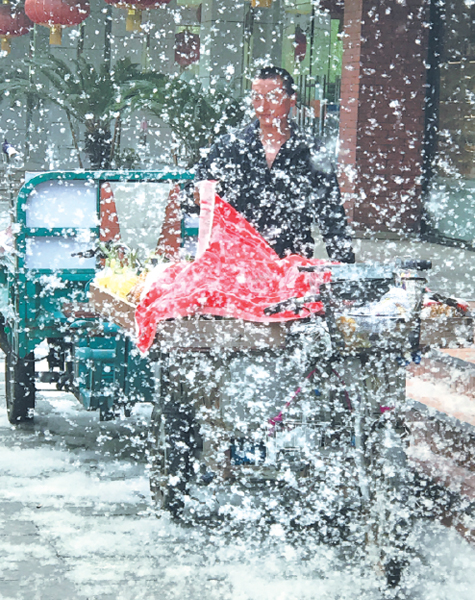Beijing under siege by catkins
 |
|
Willow catkins shroud parked vehicles and a fruit vendor on Huixin Dongjie in Beijing's Chaoyang district on Monday. [Photo by Xu Jingxing/China Daily] |
The Beijing municipal government is looking at ways to deal with the masses of willow and poplar catkins-pollenating flowers-blowing throughout the city.
Though a small number of the fluffy pods may elicit a romantic mood, too many can cause problems with traffic, street cleaning and allergic people.
To solve the problem, the Beijing Municipal Landscape and Forestry Bureau said it will trim and thin trees, and treat 400,000 willow and poplar trees with chemicals this year to limit their catkin production. It will also replace willow and poplar trees with other kinds of trees to gradually reduce the problem.
In addition, it will use high-pressure water jets to reduce floating catkins and has asked the urban cleaning department to clear away the debris in a timely manner.
According to the bureau, Beijing has 2 million poplar and willow trees, which produce a large number of catkins for about a month every spring.
Shen Guofang, a forestry expert and an academician at the Chinese Academy of Engineering, said catkins cannot be dealt with simply by cutting the trees.
"The ecological benefits from full-grown trees far out-weigh the annoyance caused by catkins," he said. "If we cut them, the city's natural environment will be damaged."
Willows and poplars account for 5.4 percent of the city's green trees, according to the bureau.
Liu Xiuchen, a consultant for the State Council who has worked in the gardening and landscape industry for decades, said that in the 1950s the government didn't have enough money to spend on greening in the capital, so the low-cost and fast-growing poplars and willows became the best choice at that time and were widely planted.
Poplars and willows produce catkins as part of their reproduction process. The city government will stop using female poplar and willow trees to limit the number, the bureau said.









